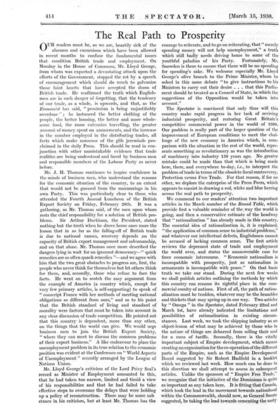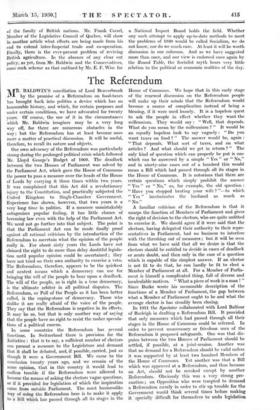The Real Path to Prosperity
OUR readers must be, as we are, heartily sick of the alarums and excursions which have been allowed in recent months to confuse the fundamental issues that condition British trade and employment. On Monday in the House of Commons, Mr. Lloyd George, from whom was expected a devastating attack upon 'the efforts of the Government, stopped the rot by a speech of encouragement which should do much to galvanize those faint hearts that have accepted the doom of British trade. He reaffirmed the truth which English- men are in such danger of forgetting, that the tendency of our trade, as a whole, is upwards, and that, as the Economist has said, " pessimism is being unjustifiably overdone ; he instanced the better clothing of the people, the better housing, the better and more whole- some food, the more extensive travelling, the greater amount of money spent on amusements, and the increase in the number employed in the distributing trades, all facts which make nonsense of the glib jeremiads pro- claimed in the daily Press. This should be read in con- junction with other unmistakable evidence that trade realities are being understood and faced by business men and responsible members of the Labour Party as never before.
Mr. J. H. Thomas continues to inspire confidence in the minds of business men, who understand the reasons for the economic situation of the country, to an extent that would not be guessed from the murmurings in his own Party. This was particularly clear to those, who attended the Fourth Annual Luncheon of the British Export Society on Friday, February 28th. It was a gathering, as Mr. Thomas said, of the men upon whom rests the chief responsibility for- a solution of British pro- blems. Sir Arthur Duckham, the President, stated nothing but the truth when he drove home once more the lesson that in so. far as the falling-off of British trade is due to national causes, recovery depends on the capacity of British export management and salesmanship, and on that alone. Mr. Thomas once more described the dangers lying in wait for an ignorant democracy—" quick remedies are so often quack remedies "—and we agree with him that the two great obstacles to progress are, first, the people who never think for themselves but let others think for them, and, secondly, those who refuse to face the facts. He went on to scotch the easy argument from the example of America (a country which, except for very few primary articles, is self-supporting) to speak of " conscript France with her methods of meeting national obligations so different from ours," and so to his point that the British standard of living and standard of morality were factors that must be taken into account in any clear discussion of trade competition. He pointed out that this country is dependent, more than any other, on the things that the world can give. We would urge business men to join the British Export Society, " where they can meet to discuss the common problems of their export business." A like endeavour to place the unemployment problem in its true relation to the economic position was evident at the Conference on " World Aspects of Unemployment " recently arranged by the League of Nations Union.
Mr. Lloyd George's criticism of the Lord Privy Seal's record as Minister of Employment amounted to this, that he had taken too narrow, limited and timid a view of his responsibilities and that he had failed to take effective steps to overcome the delays that were holding up a policy of reconstruction. • There may be some sub stance in his criticism, but at least Mr. Thomas has the courage to reiterate, and to go on reiterating, that " merely spending money will not help unemployment," a truth which still badly needs driving home to some of the youthful paladins of his Party. Fortunately, -Mr. Snowden is there to ensure that there will be no' spending for spending's sake. We welcome' especially Mr. -Lloyd George's olive branch to the Prime Minister, whom he asked in this same debate " to give instructions to his Ministers to carry out their desire . . . that this Parlia- ment should be treated as a Council of State, in -which- the suggestions of the Opposition would be taken into account."
The Spectator is convinced that only thus will this country make rapid progress in her task of reviving industrial prosperity, and restoring Great Britain's competitive commercial power in the world of 1980. Our problem is really part of the larger question of the improvement of European conditions to meet the chal- lenge of the new economy in America which, in com- parison with the situation in the rest of the world, repre- sents something as revolutionary as was the introduction of machinery into industry 150 years. ago. No greater mistake could be made than that which is being made here, there, and everywhere to-day, i.e., to interpret the problem of trade in terms of the obsolete fiscal.controversy, Protection versus Free Trade. For that reason, if for no other, we deplore the enterprise of the Press Peers, which appears to consist in drawing a red, white and blue herring across the real path to prosperity.
We commend to our readers' attention two important articles in the March number of the Round Table, which provide first a valuable reminder of the.way the world is going, and then a conservative estimate of the headway that " rationalization " has already made in this country. The essential idea of rationalization is, it is explained, "the application of common sense to industrial problems," and whatever our intellectual defects, Englishmen cannot be accused of lacking common sense. The first article reviews the depressed state of trade and employment the world over, and states the unanswerable case for freer economic intercourse. " Economic nationalism is incompatible with prosperity, just as nationalism in armaments is incompatible with peace." On that basic truth we take our stand. During the next few weeks we shall publish articles outlining the methods by which this country can resume its rightful place in the com- mercial comity of nations. First of all, the path of ration- alization must be trodden, whatever may be the, brambles and thickets that may spring up in our way. Two articles by " Omega " in the Spectator, dated February 22nd and March 1st, have already indicated, the limitations and possibilities of rationalization in existing circum- stances. Last week, we took the shipping industry as an object-lesson of what may be achieved by those who in the nature of things are, debarred from selling their soul for a mess of tariffs. . Secondly, there is the vitally important subject of Empire development, which means creating an organization for the co-operation of the different parts of the Empire, such as the Empire Development Board suggested by Sir Robert Hadfield in a booklet which we reviewed last week. How much can be done in this direction we shall attempt to assess in subsequent articles. Unlike the sponsors of " Empire Free Trade," we recognize that the initiative of the Dominions is quite as important as any taken here. It is fitting that Canada, which took the lead in the movement towards nationhood within the Commonwealth, should now, as General Smuts suggested, be taking the lead towards cementing the. unity of the family of British nations. Mr. Frank Carrel, Member of the Legislative Council of Quebec, will show in another article what efforts are being made from his end to extend inter-Imperial trade and co-operation. Finally, there is the ever-present problem of reviving British agriculture. In the absence of any clear cut policy, as yet; from Mr. Baldwin and the Conservatives, some such scheme as that outlined by Mr. E. F. Wise for a National Import Board holds the field. Whether any such attempt to apply up-to-date methods to meet the problems of 1930 would be called Socialism, we do not know, nor do we much care. At least it will be worth discussion in our columns. And as we have suggested more than once, and our view is endorsed once again by the Round Table, the Socialist myth bears very little relation to the political or economic realities of the day.





















































 Previous page
Previous page